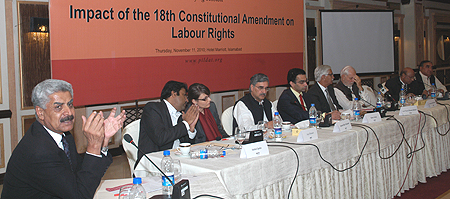|
|
| |
| EVENTS |
|
|
> PILDAT Briefing Session on Impact of the 18th Constitutional Amendment on Labour Rights
|
| |
|
PILDAT Briefing Session
November 11, 2010
Islamabad
|
|
| |
Islamabad, November 11; Citing complexities in 18th Constitutional Amendment relating to Labour laws, especially in terms of decentralisation of Workers Welfare Fund, implementation of State�s international agreements and the need for uniformity in minimum wages and standards, the panellists at the PILDAT Briefing Session urged the Federal Government to facilitate a uniformity in provincial labour laws through forums such as the Council of Common Interests. |
|
| |
Panellists at the PILDAT Briefing Session on Impact of the 18th Constitutional Amendment on Labour Rights included Mr. Fasih Karim Siddiqi, Former Director, Employers Federation of Pakistan-EFP, Mr. Zahoor Awan, Deputy General Secretary, All Pakistan Workers Federation, Mr. Babar Sattar, Advocate who has been advising the Ministry of Labour, Mr. Hamayun Saifullah Khan, MNA, Member, National Assembly Standing Committee on Labour and Manpower and Senator Syed Nayyer Hussain Bokhari, Leader of the House, Senate of Pakistan and Member, Senate Standing Committee on Labour & Manpower.
|
|
| |
Mr. Fasih Karim Siddiqi said there are some complexities with the 18th Constitutional Amendment and labour rights. Decentralization means different kind of work in every province. The general benefits should reach Labour with uniformity in all states. Some of the conventions of the ILO exact a national policy but states are not bound to follow. The federal Industrial Relations Act (IRA) stands expired and all the provinces have made their own legislation. There is need for consultation over this. This might affect the organization and unity of Labour Unions. There must be a mechanism for coordination between the provinces. The Standing committee should be the focal point. The already present mechanism between provinces should be used. The Laws can stay with the provinces but the prerogative to legislate on employment rights should be with the federation and thus the federation can lead. |
|
| |
Mr. Zahoor Awan said that the labour policy is not the prerogative of the Prime Minister of Pakistan. After the 18th Constitutional Amendment, there is a lot of confusion over jurisdiction. The employer can exploit labour because his organization is national but labour law is state-specific. If a province is in violation of general/international labour laws, is it accountable to conventions of the ILOs? The dilemma lies in the fact that all institutions are national and labour rights are local. The decentralization of Workers Welfare Fund is very inimical to smaller states. There is a dire need for dialogue over these issues. The IRA ended in April 2010 and there is no road map or consultation for the future. |
|
| |
Mr. Babar Sattar said that industrial Relations Law and other laws that affect the labour are with the provinces now. The federation can still address these subjects. For example: Social rights and equality are in the Constitution. The federation can also legislate over this because the Federal List has the obligation of honouring treaties with international organizations. With the advice of the Council of Common Interests (CCI) the federation can assist coordination between provinces. There should be reformed legislation. All provinces cannot negotiate directly with the ILOs therefore the federation should provide the baseline for labour rights. The labour unions with inter-provincial organization must be under a federal law. A new federal pension law should be formed and the state should chip in under FLL. He believed that the 1969 Act is enforced as of now unless a new Act is introduced. |
|
| |
Mr. Hamayun Saifullah Khan, MNA said that the federation is still empowered over basic laws. The implementation of laws is very important and the process of implementation must be transparent. |
|
| |
Senator Syed Nayyer Hussain Bokhari said that the abolition of concurrent list was a long-standing demand of the provinces. The Government is also cognizant of the complexity on this issue and will work to accommodate the labour unions of Pakistan and to facilitate uniformity of codes.
A large number of participants joined in the discussion belonging to labour unions, Parliament, business community and the media. Some of the major issues highlighted during the discussion included that all labour laws have been inherited from the international Labour movement. The decentralization should not affect international labour solidarity. There is a need for harmonizing the Labour laws within the provinces in order to the improve Foreign Direct Investment (FDI) and minimize disparity between provinces with regards to the FDI. The EOBI suffers from under-registration which affects labour adversely because there is no law.
Earlier, Mr. Ahmed Bilal Mehboob, Executive Director PILDAT, while initiating the Briefing Session, said that PILDAT has facilitated a discussion in order to bring to light various perspectives that exist on the issue of uniformity of labour laws and their application across provinces after the omission of the concurrent list from the Constitution of Pakistan. |
|
| |
The PILDAT body of work on labour issues, related legislation and how should Parliament and Parliamentary Committees interact with and address labour issues include:
|
|
| |
PILDAT received the support of the Friedrich Ebert Stiftung � FES Pakistan in holding the Briefing Session. Ms. Anja Minnaert, country representative FES and Mr. Abdul Qadir, Programme Manager, FES, were also represented at the Briefing Session. |
|
| |
|
|
| |

|
|
| |
|
|
| |

|
|
| |
|
|
| |

|
|
|
|
|
|
|
|
|